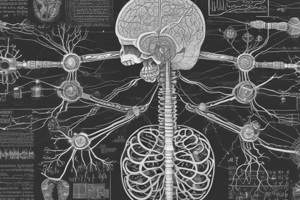Podcast
Questions and Answers
What can falsely elevate values in unpurified water with traces of sodium ions?
What can falsely elevate values in unpurified water with traces of sodium ions?
Sodium ions.
What percentage of water does the human body contain?
What percentage of water does the human body contain?
The human body contains 40-75% water.
What can falsely elevate values in unpurified water with traces of sodium ions?
What can falsely elevate values in unpurified water with traces of sodium ions?
Sodium ions.
What is the major function of potassium in the body?
What is the major function of potassium in the body?
What is the major function of potassium in the body?
What is the major function of potassium in the body?
Where is water located in the human body?
Where is water located in the human body?
What organ is important in regulating K+ balance?
What organ is important in regulating K+ balance?
Which organ is important in regulating potassium balance?
Which organ is important in regulating potassium balance?
How are concentrations of ions in cells maintained?
How are concentrations of ions in cells maintained?
What are some factors that can cause hypokalemia?
What are some factors that can cause hypokalemia?
What is osmolality based on?
What is osmolality based on?
What are some factors that can cause hypokalemia?
What are some factors that can cause hypokalemia?
What does the hypothalamus do in response to increased osmolality?
What does the hypothalamus do in response to increased osmolality?
What can cause hyperkalemia?
What can cause hyperkalemia?
What can cause hyperkalemia?
What can cause hyperkalemia?
Why are potassium levels in plasma slightly lower than in serum?
Why are potassium levels in plasma slightly lower than in serum?
What is the normal plasma osmolality range?
What is the normal plasma osmolality range?
Why are potassium levels in plasma slightly lower than in serum?
Why are potassium levels in plasma slightly lower than in serum?
What is chloride's major function in the body?
What is chloride's major function in the body?
What does the osmolal gap indicate?
What does the osmolal gap indicate?
What is the major function of chloride in the body?
What is the major function of chloride in the body?
What stimulates aldosterone secretion to conserve Na+ and Cl-?
What stimulates aldosterone secretion to conserve Na+ and Cl-?
What hormone is stimulated by excessive sweating to conserve Na+ and Cl-?
What hormone is stimulated by excessive sweating to conserve Na+ and Cl-?
Why are electrolytes required in the human body?
Why are electrolytes required in the human body?
What are some causes of hypochloremia?
What are some causes of hypochloremia?
What are the specific electrolytes required for each bodily process?
What are the specific electrolytes required for each bodily process?
What can cause hypochloremia?
What can cause hypochloremia?
What can prolonged vomiting cause?
What can prolonged vomiting cause?
What is required for ATP production from glucose?
What is required for ATP production from glucose?
What can prolonged vomiting cause?
What can prolonged vomiting cause?
What is the difference between intracellular and extracellular compartments?
What is the difference between intracellular and extracellular compartments?
What is the Fiske-Subbarow method commonly used for?
What is the Fiske-Subbarow method commonly used for?
What hormones play a role in regulating electrolyte levels?
What hormones play a role in regulating electrolyte levels?
What is the most abundant cation in extracellular fluid?
What is the most abundant cation in extracellular fluid?
What is the function of ADH?
What is the function of ADH?
What is the Fiske-Subbarow method commonly used to measure?
What is the Fiske-Subbarow method commonly used to measure?
Flashcards are hidden until you start studying
Study Notes
- Human body contains 40-75% water.
- Water is located in intracellular and extracellular compartments.
- Concentrations of ions in cells are maintained by active and passive transport.
- Osmolality is a physical property based on solute concentration.
- Hypothalamus responds to increased osmolality by stimulating thirst and ADH secretion.
- Normal plasma osmolality is 275-295 mOsm/kg of plasma H20.
- Osmolal gap indicates presence of substances other than Na+, urea, or glucose.
- Electrolytes are required for various bodily processes such as volume and osmotic regulation, myocardial rhythm and contractility, enzyme activation, ATPase ion pumps, acid-base balance, blood coagulation, and neuromuscular excitability.
- Specific electrolytes required for each process include sodium, potassium, chloride, magnesium, calcium, zinc, bicarbonate, and phosphate.
- ATP production from glucose also requires magnesium.
Studying That Suits You
Use AI to generate personalized quizzes and flashcards to suit your learning preferences.





